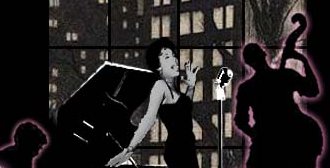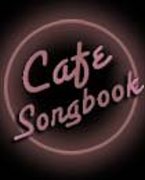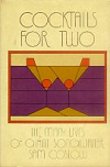Welcome toCafe SongbookInternet Home of the |
 |
 |
| Home || Songs || Songwriters || Performers || Articles and Blogs || Glossary || About Cafe Songbook || Contact/Submit Comment | |
| Search Tips: 1) Click "Find on This Page" button to activate page search box. 2) When searching for a name (e.g. a songwriter), enter last name only. 3) When searching for a song title on the catalog page, omit an initial "The" or "A". 4) more search tips. | |
| Portions of this page have not yet been completed. Thank you for your patience. | ||
Just One More Chance |
||
Written: 1931 |
Words and Music by: Sam Coslow and Arthur Johnston |
Written for: Independent Publication |
| Page Menu | ||
| Main Stage || Record/Video Cabinet || Reading Room || Posted Comments || Credits | ||
On the Main Stage at Cafe Songbook |
|
| This section is currently incomplete. | |
| code (Please complete or pause one video before starting another.) |
Artistperforming "Title"with Personnel/at
More Performances of "title" |
Cafe Songbook Reading Room"Just One More Chance" |
|
| About the Origins of the Song | |
|
At a time when Coslow and Johnston were in Hollywood writing songs exclusively for the movies, Johnston came up with an idea for a song he thought would be good for Bing Crosby to record independently. In 1931 Crosby was just becoming popular on a national level and both songwriters were fans. Johnston approached his partner Coslow with a title and a musical phrase to go with it and Coslow liked what he heard, except he was doubtful about getting anywhere with a song not headed for a film because as he said to Johnston, "the radio bands aren't playing anything these days except movie songs." Johnston reminded Coslow that Bing was singing with the Gus Arnheim Orchestra at The Coconut Grove in Hollywood, performances that went out over the airwaves on the NBC radio network greatly increasing the chances of success. Coslow's enthusiasm for the song quickly grew and the team "finished 'Just One More Chance' before the afternoon was over, tailoring the song especially for Crosby's croony ballad style." Eddie Janis, manager for the publisher West Coast Famous Music, was consulted and his support led to the song writing team playing and singing it for Bing who officially introduced the song a few nights later on Arnheim's broadcast from the Grove. Coslow recalls, "We were at the Grove ourselves to hear the song's debut that night, and heard the crowd of Hollywoodites on the dance floor demanding encore after encore. Bing had stopped the show with the song." On the night of the debut, the producer-director Mack Sennett was in the audience. Loving Bing and the song, he asked Crosby to make a short film to be tilted "One More Chance" for which he would be paid $750, a very big deal for Crosby at that point in his career and especially helpful in that he had just married the starlet Dixie Lee.
Crosby recorded the song for Brunswick and thanks to Jack Kapp head of the record company, "Just One More Time" was in the record stores almost immediately after the sheet music. This was the first time Crosby, instead of the orchestra leader, received top billing on a record, a sign of the singer's growing prominence. Within a month the song was number one nationally. It continued to be instrumental in Crosby's rise having been heard by William S. Paley, head of CBS, who signed the singer after hearing his recording. (Coslow, Cocktails for Two, pp. 110-114) According to Crosby biographer Gary Giddins, "Bing was about to become the defining voice of his era, and for many people, this ["Just One More Chance"] was the salvo that announced his arrival. It did for him, in 1931, what "All or Nothing at All" would do for Frank Sinatra in 1943, what "Heartbreak Hotel" would do for Elvis Presley in 1956, what "I Want to Hold Your Hand" would do for the Beatles in 1964." (Giddins, Crosby, p. 246). |
| back to top of page | |
| Critics Corner | |
| (This section is currently in preparation.) | |
| back to top of page | |
| Lyrics Lounge | |
(This section is currently in preparation.) Click here to read Cafe Songbook lyrics policy. |
|
| back to top of page | |
Visitor CommentsSubmit comments on songs, songwriters, performers, etc.
Feel free to suggest an addition or correction. Please read our Comments Guidelines before making a submission. (Posting of comments is subject to the guidelines. Not all comments will be posted.) |
| To submit a comment, click here. |
Posted Comments on "Just One More Chance":
No Comments as yet posted |
| back to top of page |
Credits("Just One More Chance" page) |
Credits for Videomakers of custom videos used on this page:
Borrowed material (text): The sources of all quoted and paraphrased text are cited. Such content is used under the rules of fair use to further the educational objectives of CafeSongbook.com. CafeSongbook.com makes no claims to rights of any kind in this content or the sources from which it comes.
Borrowed material (images): Images of CD, DVD, book and similar product covers are used courtesy of either Amazon.com
Any other images that appear on CafeSongbook.com pages are either in the public domain or appear through the specific permission of their owners. Such permission will be acknowledged in this space on the page where the image is used.
For further information on Cafe Songbook policies with regard to the above matters, see our "About Cafe Songbook" page (link at top and bottom of every page). |
This section is currently incomplete. The Cafe Songbook |
||
|
Performer/Recording Index
(*indicates accompanying music-video)
|
||
Year Music-Video
Notes: |
||
| back to top of page | ||
Year Music-Video
Notes: |
||
| back to top of page | ||
Year Music-Video
Notes: |
||
| back to top of page | ||
Year
Music-Video: Notes: |
||
| back to top of page | ||
Year Music-Video
Notes: |
||
| back to top of page | ||
Year Music-Video
Notes: |
||
| back to top of page | ||
Year Music-Video
Notes: |
||
| back to top of page | ||
Year Music-Video
Notes: |
||
| back to top of page |
| Home || Songs || Songwriters || Performers || Articles and Blogs || Glossary || About Cafe Songbook || Contact/Submit Comment | |
© 2009-2018 by CafeSongbook.com -- All Rights Reserved |

